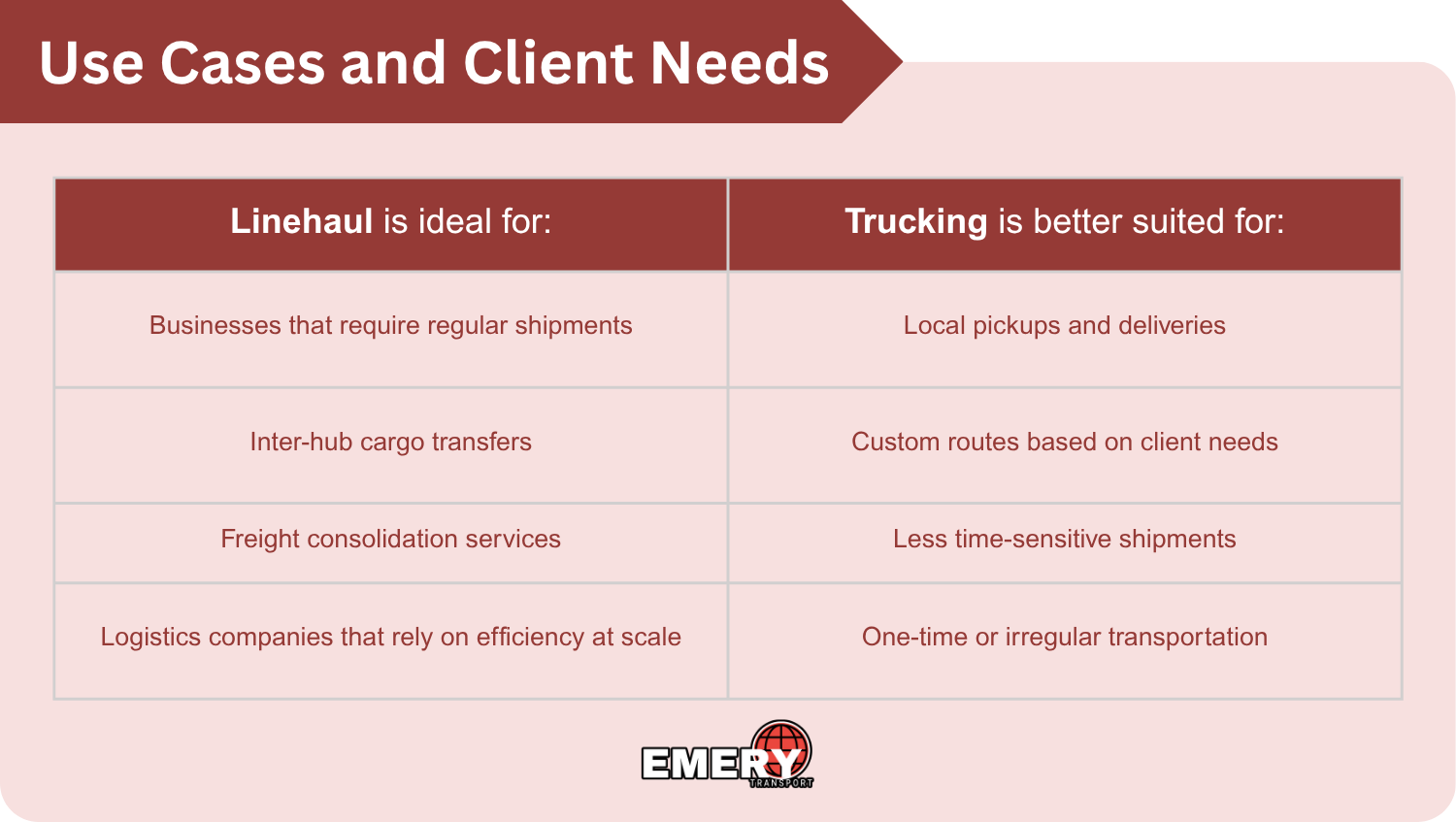The logistics world uses a variety of terms to describe how goods move—some of which sound interchangeable but represent distinct parts of the supply chain. One of the most frequently asked questions is: What is the difference between linehaul and trucking? Understanding this distinction helps companies optimize transportation, reduce costs, and improve reliability. Emery Transport’s linehaul services provide a notable example of how this model integrates into a broader freight strategy.
Whether you’re a logistics manager, a small business owner, or just curious about how freight moves across Canada, this guide will help you understand the functional and strategic differences between these two core transportation models.
Defining the Concepts: Linehaul vs General Trucking
Before exploring how each method works, it’s essential to define the terms clearly.
What Is Linehaul?
Linehaul refers to the scheduled transportation of goods between specific terminals, hubs, or distribution centers. These are typically mid- to long-distance routes, often connecting major cities or logistics hubs across provinces or countries.
At Emery Transport, linehaul is a structured, time-sensitive service that keeps large volumes of freight moving consistently and predictably across fixed routes.
What Is Trucking?
Trucking, on the other hand, is a broader term that includes any ground-based freight transport using trucks, regardless of distance or scheduling. It encompasses everything from short local deliveries to long-haul shipping, and includes both dedicated and flexible routes.
How Are They Operationally Different?
Though both linehaul and general trucking involve moving goods by truck, they differ in function, scheduling, and logistics structure.
Route Structure and Scheduling
Linehaul transportation operates on predefined routes and schedules. Freight is typically consolidated at a hub, then shipped along designated corridors to another hub, where it is sorted for local delivery.
General trucking is far more flexible. It may involve direct point-to-point delivery, irregular schedules, and variable destinations. It’s suitable for one-off or ad-hoc shipments where the route may change daily.

Strategic Value of Linehaul Services
For clients that ship frequently or manage large volumes, linehaul provides immense value. It reduces overall cost through freight consolidation, improves reliability through fixed routes, and supports fast transit by minimizing unnecessary stops.
At Emery Transport, linehaul services are managed with:
- Dedicated schedules for optimal planning
- Route efficiency powered by real-time data
- Secure freight handling during inter-hub transitions
What is the difference between linehaul and trucking?
While both involve transporting goods using trucks, linehaul is focused on scheduled routes between central hubs. At the same time, trucking is a broader term that includes all types of freight delivery, whether local, irregular, or long-distance.
Common Linehaul + Trucking Integration
Most logistics systems blend both models. A package may first be delivered locally (via trucking), then moved across provinces via linehaul, and finally sent on a local trip (via trucking again) to its end destination.
This hybrid approach allows Emery Transport to deliver full-spectrum logistics that combine the predictability of linehaul with the flexibility of general trucking.
Technology and Tracking Differences
Linehaul operations typically involve automated tracking systems that monitor the progress of freight between hubs. Due to the fixed routing and consistency, shippers benefit from more accurate ETAs and increased shipment visibility.
In contrast, trucking—especially on ad-hoc routes—may rely on mobile GPS and dispatch systems that are less predictable but more adaptable to changing client needs.
Cost Comparison: Which Is More Efficient?
Linehaul generally offers more economical pricing per kilometre due to bulk shipping and repeatable logistics. Trucking, especially for customized or same-day deliveries, can be more expensive due to labour, fuel, and lower shipment volumes.
That said, combining the two intelligently can result in:
- Better last-mile delivery
- Reduced transit times
- Scalable logistics for any size operation
What is linehaul transportation?
This refers to the structured movement of freight between designated terminals or hubs, often as part of a broader logistics network. Emery Transport uses this method to connect major distribution centers efficiently and reliably.
Montreal Logistics: Why the Difference Matters
In a busy logistics hub like Montreal, companies benefit from clearly understanding when to use linehaul versus trucking. Linehaul is best for intercity or cross-provincial freight transfers. Trucking shines in local distribution or when flexibility is more important than speed.
By working with Emery Transport, clients receive expert guidance on when and how to use each model, ensuring cost-effective and reliable delivery throughout Quebec and across Canada.
What is the difference between line haul and long haul?
Line haul generally refers to structured, scheduled transport between freight hubs. Long haul is a broader category of over-the-road trucking that spans long distances and may not follow fixed routes. While they often overlap, linehaul is part of a planned logistics system, while long haul may be more route-variable.


